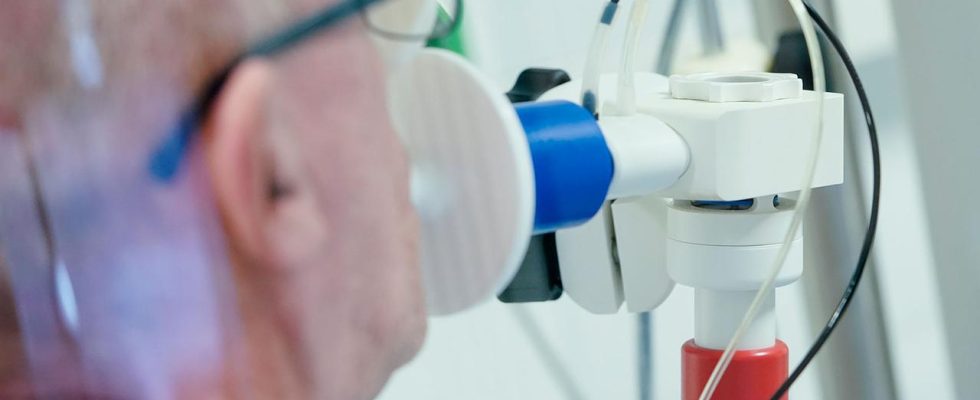The traffic light coalition wants to help Long Covid patients, but money is tight. Federal Health Minister Lauterbach has invited people to a round table today. There is a lot to discuss.
Long Covid patients who are waiting for an appointment with Bernhard Schieffer need a lot of patience. But those affected usually don’t have this. Thousands are on the waiting list and need help quickly, says cardiologist Schieffer.
The longer patients wait, the less likely it is that they can receive comprehensive help. In some cases, they also receive the wrong therapy, which makes everything worse, before they get to Schieffer’s special outpatient clinic. The doctor heads one of the three large specialist outpatient clinics in Germany: one in Marburg, one in Berlin and one in Munich. The ambulances can hardly cope with the rush. At Schieffer the waiting time is about a year.
How many Long Covid patients are there?
The doctor can report what he experienced today at the round table on Long Covid in the Federal Ministry of Health. Karl Lauterbach wants those affected, researchers, the medical profession, health insurance companies and others to exchange ideas there.
People who are suffering from Long Covid should describe what experiences they have and how their situation could improve. Much about the disease is still uncertain. There are different estimates as to how many people actually have Long Covid.
No approved medications yet
Experts assume that immediately after an infection, around ten percent struggle with the symptoms for a longer period of time. The complaints can be diverse. These include fatigue, memory problems, shortness of breath and muscle pain.
About three percent remain seriously ill over the long term, says Professor Carmen Scheibebogen. So far, doctors can only treat symptoms such as pain or sleep disorders. There is currently no cure or approved medication in sight.
It’s not a mental illness
A clear diagnosis is often difficult. Because many doctors still know far too little about the disease. “We didn’t learn that in the same way during our studies, it’s something new,” says the deputy chairwoman of the General Practitioners Association, Nicola Buhlinger-Göpfarth.
She sees family doctor practices now well positioned to help most of those affected. Especially since family doctors often know their patients well and have experience with chronic illnesses. From her point of view, it is particularly important to signal to Long Covid patients that it is not a mental illness. After weeks or months of regular treatment, most people feel significantly better, says Buhlinger-Göpfarth, describing the experience from the practices. “A few remain, a few with severe symptoms.”
network settled doctors
These people often have an odyssey before they get an appointment at a specialist outpatient clinic. Sometimes the patients’ suffering is dismissed as psychological problems.
Scheibenbogen heads the special outpatient clinic at the Charité in Berlin. It calls for clear guidelines as to who needs to be treated in a special center and who can also be well cared for by their family doctor. In Berlin, for example, a network of resident doctors has been founded and offers further training. Discussion and clear structures are essential, says Scheibebogen, in order to treat patients in the best possible way with the few resources available.
Off-label therapy required
The doctor also hopes for progress in the area of off-label therapy. This refers to the treatment of a patient with a drug that is approved for another disease, but not yet for Long Covid in this case. This applies, for example, to patients who have circulatory problems after a corona infection, says Scheibebogen. There are a number of medications that could help.
The same is true with chronic fatigue syndrome ME/CFS, which some patients develop later on. But these medications are not reimbursed by health insurance companies. This means that patients have to pay for it themselves. Not everyone can do that. The professor is therefore calling for special regulations. She also suggests a list of recommendations so that more doctors are aware of and prescribe these medicines.
Ampel had big plans
The traffic light government had actually planned to improve the care of those affected by Long Covid. In the coalition agreement, the SPD, Greens and FDP agreed to create “a Germany-wide network of competence centers and interdisciplinary outpatient clinics”. With the aim of helping patients with long-term consequences of Covid 19 and ME/CFS – and making progress in research into the disease.
Lauterbach pointed out the possible long-term consequences of Corona early on and was still warning loudly when most people no longer wanted to hear it. But little has happened since then.
Union criticizes that “Announcement Minister”
At the beginning of the year, the Federal Minister of Health loudly announced a program: 100 million euros would be allocated to healthcare research. However, Lauterbach was unable to prevail. After tough budget negotiations, around 20 million euros are initially earmarked, which the Ministry of Health will contribute and around 20 million euros from a special pot that is also financed by statutory health insurance companies.
This is a bitter disappointment for those affected who are waiting for help. For the opposition it is an open flank. The CDU health politician Sepp Müller, for example, criticizes Lauterbach as an “announcement minister”. Even traffic light health politicians say they want to look for ways to increase the funding.
Pharmaceutical companies refuse
From the perspective of cardiologist Schieffer, that is not enough. He is demanding long-term financial commitments from politicians in order to build a network of specialist outpatient clinics and make progress in health care research. Ten centers are needed, each equipped with ten million euros per year. In total, that would be money worth one billion euros over ten years. It is also about testing possible medications in studies. He hopes to join forces with the pharmaceutical industry.
But pharmaceutical companies have so far shown little interest in researching this area. From the Health Minister’s point of view, this is “disappointing”. Long Covid is “not a niche problem”. He wants to make the pharmaceutical industry more responsible for developing effective drugs. Also because he assumes that people will not only become infected with Corona in the future, but will also have to struggle with the long-term consequences.


